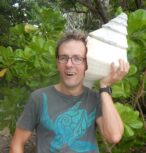DNA reveals the past and future of coral reefs
New DNA techniques are being used to understand how coral reacted to the end of the last ice age in order to better predict how they will cope with current changes to the climate. James Cook Univer

From 2005 to 2022, the main node of the ARC Centre of Excellence for Coral Reef Studies was headquartered at James Cook University in Townsville, Queensland (Australia)








Abstract: Coral assemblages from the remote Kimberley coast in North Western Australia thrive despite experiencing extreme heat, aerial exposure and fluctuating turbidity. These corals present an opportunity to learn about the mechanisms underpinning tolerance to heat and other stressors, but perhaps due to their extreme remoteness they remain little studied compared other extremophilic assemblages. In this talk I will present results from population whole genome sequencing of Acropora digitifera across multiple inshore and offshore sites in North Western Australia. A unique aspect of this study is the relatively deep (>15x) sequencing per-individual which allowed us to phase haplotypes and employ a range of powerful new techniques to infer demographic history and identify sites under selection. Although there are many benefits to this approach, one of the most compelling is the ability to probe recent evolutionary history, potentially allowing genomic signatures to be linked with specific events such as the end of the last glacial maximum. As sequencing costs continue to fall whole genome sequencing is becoming an attractive alternative to reduced representation approaches in corals. It is hoped that this talk will shed light on some of the opportunities afforded by this technique.
Biography: Ira Cooke received his PhD in soft-matter physics from ANU in 2004 and did his first post-doc at the Max-Planck Institute for Polymer Physics in Germany from 2005-2006. He then moved to the University of Cambridge, UK where he attempted to apply his computational skills to building socio-ecological models of farmed landscapes. In 2010 he moved back to Australia where he worked as a bioinformatician in the La Trobe University proteomics facility and had the opportunity to work on a variety of DNA, RNA and Protein sequencing projects. From 2012-2016 he was a significant contributor to the Galaxy bioinformatics framework, adding its first suite of tools for Proteomics. Since 2016 he has been employed as a senior lecturer in bioinformatics at James Cook University where he teaches a full semester course in bioinformatics. His research is now focused on understanding population genetics and genome evolution of marine taxa, especially corals. To achieve these goals he often adapts cutting-edge methods from human genomics to non-model organisms and occasionally develops new bioinformatic tools.
New DNA techniques are being used to understand how coral reacted to the end of the last ice age in order to better predict how they will cope with current changes to the climate. James Cook Univer
A new study on the effects of climate change in five tropical countries has found fisheries are in more trouble than agriculture, and poor people are in the most danger. Distinguished Profess
James Cook University researchers have found brightly coloured fish are becoming increasingly rare as coral declines, with the phenomenon likely to get worse in the future. Christopher Hemingson, a
Researchers working with stakeholders in the Great Barrier Reef region have come up with ideas on how groups responsible for looking after the reef can operate more effectively when the next bleaching
Abstract: As marine species adapt to climate change, their heat tolerance will likely be under strong selection. Individual variation in heat tolerance and its heritability underpin the potential fo
Abstract: The Reef Ecology Lab in KAUST’s Red Sea Research Center explores many aspects of movement ecology of marine organisms, ranging from adult migrations to intergenerational larval dispersal
Abstract: Macroalgal meadows are a prominent, yet often maligned component of the tropical seascape. Our work at Ningaloo reef in WA demonstrate that canopy forming macroalgae provide habitat for ad
Abstract: Sharks are generally perceived as strong and fearsome animals. With fossils dating back at least 420 million years, sharks are not only majestic top predators but they also outlived dinosa
Abstract: Connectivity plays a vital role in many ecosystems through its effects on fundamental ecological and evolutionary processes. Its consequences for populations and metapopulations have been
Abstract: Evolution of many eukaryotic organisms is affected by interactions with microbes. Microbial symbioses can ultimately reflect host’s diet, habitat range, and even body shape. However, how
Abstract: The past few years have seen unprecedented coral bleaching and mortality on the Great Barrier Reef (GBR) but the consequences of this on biodiversity are not yet known. This talk will expl